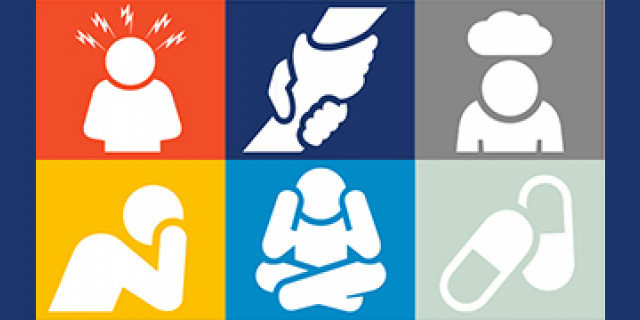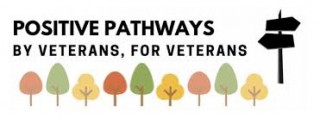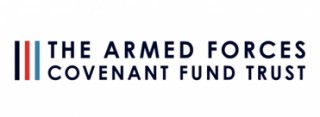Training for Veterans’ Wellbeing - May 2021
TRAINING OVERVIEW
A very warm welcome to this page Here you will have ‘on-demand’ access to the Combat Stress Training Programme for Organisations, to improve veteran wellbeing and mental health. This training package has been developed to support Positive Pathways Programme grant holding organisations. Sincere thanks to the Armed Forces Covenant Fund Trust for their generous funding of this programme.
Overview of the training:
This overall aim of the training is to help you recognise when a veteran is struggling with their mental health and know what to do to support their emotional wellbeing. The intention is to assist you to create even better outcomes for veterans as they move along a wider recovery pathway, ultimately improving veteran mental health and wellbeing
The full programme includes four modules:
- Module 1: Understanding Wellbeing and Resilience and How to Foster It
- Module 2: Understanding Why Veterans May Be More Vulnerable to Poor Mental Health
- Module 3: Responding to Veterans Who May Be Struggling with Poor Mental Health
- Module 4: Building Trauma Informed Organisations
Modules will become available on this page on a monthly basis between September and December 2020.
MODULE 1
Understanding Wellbeing and Resilience and How to Foster It
Learning Outcomes:
- Understand core models of wellbeing and the key components of these
- Raise your awareness of the factors that may prevent wellbeing
- Familiarise yourself with the six core areas of resilience in veteran populations
- Be equipped with practical strategies to foster resilience and wellbeing in the veterans you are working with
- Gain confidence in providing emotional support
- Be equipped with ways to start a conversation about emotional wellbeing with a veteran you are working alongside
- Have the opportunity to reflect on the wellbeing factors relevant to the work of your organisation and put a plan in place to take action on your learning
- Prepare yourself for module two of the programme - understanding why veterans may be more vulnerable to poor mental health
Intended Audience:
- Individuals from organisations who have received Positive Pathways Programme funding and are supporting veteran focussed activities, including organisational employees and volunteers.
Total Learning Time:
- Approximately ninety minutes per module. You may wish to schedule longer for discussion time if you are learning in a group format with other members of your organisation. Six hours total learning time to complete the four-module training programme.
Training Materials:
Link to four files:
Evaluation and Feedback:
Thank you for participating in this training. We would be grateful if you could complete a short evaluation form. Your feedback is valuable with and will help us shape future support we provide to grant holding organisations.
MODULE 2
Understanding Why Veterans May Be More Vulnerable to Poor Mental Health
Learning Outcomes:
- Consider the unique culture of military and civilian life, appreciating the strengths and possible vulnerabilities
- Familiarise yourself with the role and impact of service-related trauma
- Raise your awareness of the potential significance of early adversity / trauma
- Gain confidence in the key factors that may support and challenge the transition from military to civilian life
- Be equipped with practical strategies to support the transition from military to civilian life in the veterans you are working with
- Have the opportunity to reflect on the wellbeing factors relevant to the work of your organisation and put a plan in place to take action on your learning
- Prepare yourself for module three of the programme – responding to veterans who may be struggling with poor mental health
Training Materials:
Link to training resources:
Evaluation and Feedback:
Thank you for participating in this training. We would be grateful if you could complete a short evaluation form. Your feedback is valuable with and will help us shape future support we provide to grant holding organisations.
Module 3:
Understanding and Responding to Veterans Who May be Struggling with Poor Mental Health
Learning Outcomes:
- Familiarise yourself with the common types of emotional distress following service
- Raise your awareness of the key signs and symptoms of anxiety, depression and post-traumatic stress disorder amongst veteran populations
- Be equipped with practical strategies based on grounding and sensory techniques to support veterans in emotional distress
- Gain confidence to use a four-step framework to assist you to have supportive conversations about emotional wellbeing
- Know when to provide emotional support and when and how to signpost to appropriate support services
- Have the opportunity to reflect on how your organisation supports veterans who may be struggling with poor mental health and put a plan in place to take action on your learning
- Prepare yourself for module four of the programme – building trauma informed organisations.
Training Materials:
Link to training resources:
Evaluation and Feedback:
Thank you for participating in this training. We would be grateful if you could complete a short evaluation form. Your feedback is valuable with and will help us shape future support we provide to grant holding organisations.
Module 4
Building Trauma Informed Organisations
Learning Outcomes:
- Raise your awareness of how common the experience of trauma is for everyone, and how trauma may specifically impact the veterans you support
- Recognise some of the ways that trauma might be affecting veterans you meet, especially how they view relationships
- Be able to respond more effectively with veterans by taking into account the impact trauma has had on them
- Recognise the importance of offering safety, trust, choice, collaboration, control and empowerment to veterans you have contact with
- Have the opportunity to reflect on your own practice and your organisational culture who may be affected by trauma. how your organisation supports veterans who may be struggling with poor mental health and put a plan in place to take action on your learning
Training Materials:
Evaluation and Feedback: Thank you for participating in this training. We would be grateful if you could complete a short evaluation form. Your feedback is valuable with and will help us shape future support we provide to grant holding organisations. https://www.surveymonkey.co.uk/r/CSTrainingCS2
Associated Resources and Further Reading:
Combat Stress have a library of online self-help resources available, covering a wide range of emotional and mental health issues. Please do explore our resources by clicking here
For Further Mental Health Advice and Support:
The Combat Stress 24/7 free Helpline is 0800 138 1619 and is available to all veterans and their families for confidential mental health advice and support.
Acknowledgements:
- Sincere thanks to Combat Stress co-authors: Jolandi du Preez, Lead Occupational Therapist, Dr Naomi Wilson, Consultant Clinical Psychologist and Head of Psychological Therapies, Dr Walter Busuttil, Consultant Psychiatrist and Medical Director, Dr Jen Bateman, Principal Clinical Psychologist, members of the Combat Stress National Veterans’ Voice and all colleagues who provided invaluable review and feedback.
Copyright Information:
© Combat Stress 2020
Combat Stress exercises full Copyright over this material, which is made available on the condition that it is used solely for personal purposes and not circulated for commercial gain. Whilst all due diligence has been applied to the collation and preparation of this material, Combat Stress accepts no liability whatsoever, for the manner in which it is used or acted upon.
Please Note:
This training is educational, not therapeutic in nature. If you or a person you are supporting require more urgent help, please contact your GP or call 111. In an emergency, dial 999.
The Combat Stress 24/7 free Helpline is 0800 138 1619 and is available to all veterans and their families for confidential mental health advice and support.

VETERAN SELF-HELP GUIDES
During COVID-19


